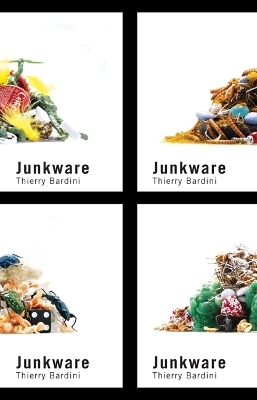
Junkware
University of Minnesota Press (Verlag)
978-0-8166-6750-5 (ISBN)
Are we made of junk? Thierry Bardini believes we are. Examining an array of cybernetic structures from genetic codes to communication networks, he explores the idea that most of culture and nature, including humans, is composed primarily of useless, but always potentially recyclable, material otherwise known as "junk."
Bardini unravels the presence of junk at the interface between science fictions and fictions of science, showing that molecular biology and popular culture since the early 1960s belong to the same culture-cyberculture-which is essentially a culture of junk. He draws on a wide variety of sources, including the writings of Philip K. Dick and William S. Burroughs, interviews with scientists as well as "crackpots," and work in genetics, cybernetics, and physics to support his contention that junk DNA represents a blind spot in our understanding of life.
At the same time, Junkware examines the cultural history that led to the encoding and decoding of life itself and the contemporary turning of these codes into a commodity. But he also contends that, beyond good and evil, the essential "junkiness" of this new subject is both the symptom and the potential cure.
Thierry Bardini is professor of communication at the University of Montreal.
Contents
Acknowledgments
Coda: Lambdas All Over the Place
Introduction, or a set of promoters: Robbe-Grillet Cleansing Every Object in Sight, and Vik Muniz Piling Them Up
PL Envoi: where one learns about a deafening condition and a couple of figures of junk--PR' Presence of junk, this signature of our age--Pantiq Philology of junk, or what's in this name, the fabric of the rhizome, our very fiber--PRE Mapping junk, or how I wrote this book (or, maybe, how it wrote me)--PR Bio-molecular junk, first three chapters of the book: this uncanny detail on our genetic capital--PRM The Junkness of culture, last three chapters of the book, that might not be chapters at all: out of control.
Part I. 3' Bio-Molecular Junk
Chapter 1, or a repressor complex: How Junk Became, and Why it Might Remain, Selfish
cI On genetic insignificance and its semiotics, or variations on the uncanny detail created by a "mini-revolution"--OR3 Bootstraps: two opposite takes on junk DNA, selfish and snake--OR2 The selfish contention, a repressor argument in Nature--OR1 Even the sharpest razor cannot shave its handle (scholastics return with a vengeance)--cro Genes and signs of meaning, or the fiction that turned us into junk--N Why junk might remain selfish, after all--Q Design, or everybody's good for a make-over.
Chapter 2, mostly head: From Garbage to Junk DNA, or Life as a Software Problem
cII Incipit junk: Ohno and the birth of a name--A (May) a thousand loops (bloom), or from teleology to teleonomy--B Regulation, without a program--C Bioinformatics, biologists using computers (or the other way around)--D Hyperreal junk, the aufhebung of code itself.
Chapter 3, head again: Multi-Medium, or Life as an Interface Problem
E The Field, back to the snake--F Rush and Burst, a real-life encounter with the X-files.
Part II. 5' Molar Junk: Hyperviral Culture
Chapter 4, all tail: Close Encounters of the Fourth Kind
Z (which could appear to mean the end) The crime of the Millennium: it's a wonderful world, if you can afford it--U (as in U2 my son) Post-scripta: genetic capitalism and the machine of the fourth kind--V (Bio)ethics, or what to do you with your brand new (bio)engineered freedom--G The end of a common nature: junk as the black matter of the ontogenesis of the machine of the fourth kind--T Individuation, without a principle (or a program): another return of scholastics, from number to Oedipus.
Chapter 5, lysis and replication: Homo nexus, Disaffected Subject
S A philosophical fiction; nexus, nexialism and other aliens--R The debt and the contract, or nexi and addicts, all unite!--O Dis-affect, the condition of our times--P Promethean Angst: The god of junk and his paradoxical legacy, hope and all.
Chapter 6, tail again: Presence of Junk
H Stigmata, or the world Dick made--M Kipple: how it got its look and feel, from retrofitting and the semantics of Dr. Junk himself--L (yes, the "l" of "tail", the point of entry) Hypervirus, where it eventually becomes obvious why phage is the model entity for the ontogenesis of capitalism of the fourth kind--K Junkyard terror, or a mind for murder--I Junkspace, or how it got built--J Future Eves, artificial menials and capitalist re-genesis: a junk aesthetics.
De-Coda
Sib Tripping over the organism, or a tribute to Moebius: DNA is a spirit is a drug is a program--xis Thinking junk and period pieces; a Gnostic theodicy--attP (a vital non-coding sequence) Molecular gods, or when the religious is disqualified, remains the mantic--int Vanishing sequences (end credits).
Glossary
Notes
Index
| Erscheint lt. Verlag | 10.1.2011 |
|---|---|
| Reihe/Serie | Posthumanities |
| Verlagsort | Minnesota |
| Sprache | englisch |
| Maße | 140 x 216 mm |
| Themenwelt | Geisteswissenschaften ► Philosophie |
| Technik ► Elektrotechnik / Energietechnik | |
| ISBN-10 | 0-8166-6750-0 / 0816667500 |
| ISBN-13 | 978-0-8166-6750-5 / 9780816667505 |
| Zustand | Neuware |
| Haben Sie eine Frage zum Produkt? |
aus dem Bereich


